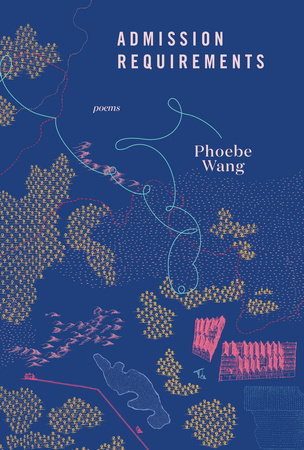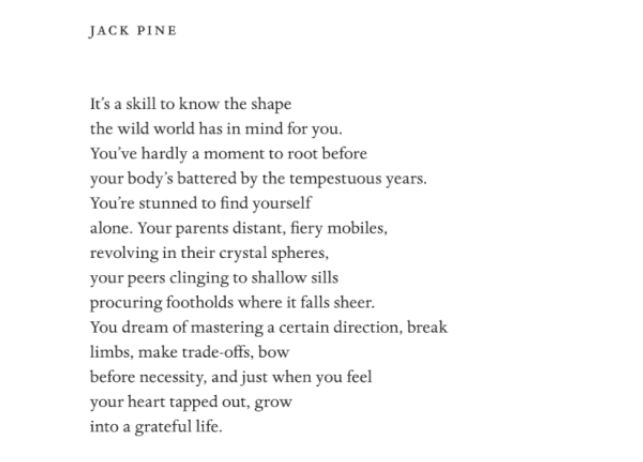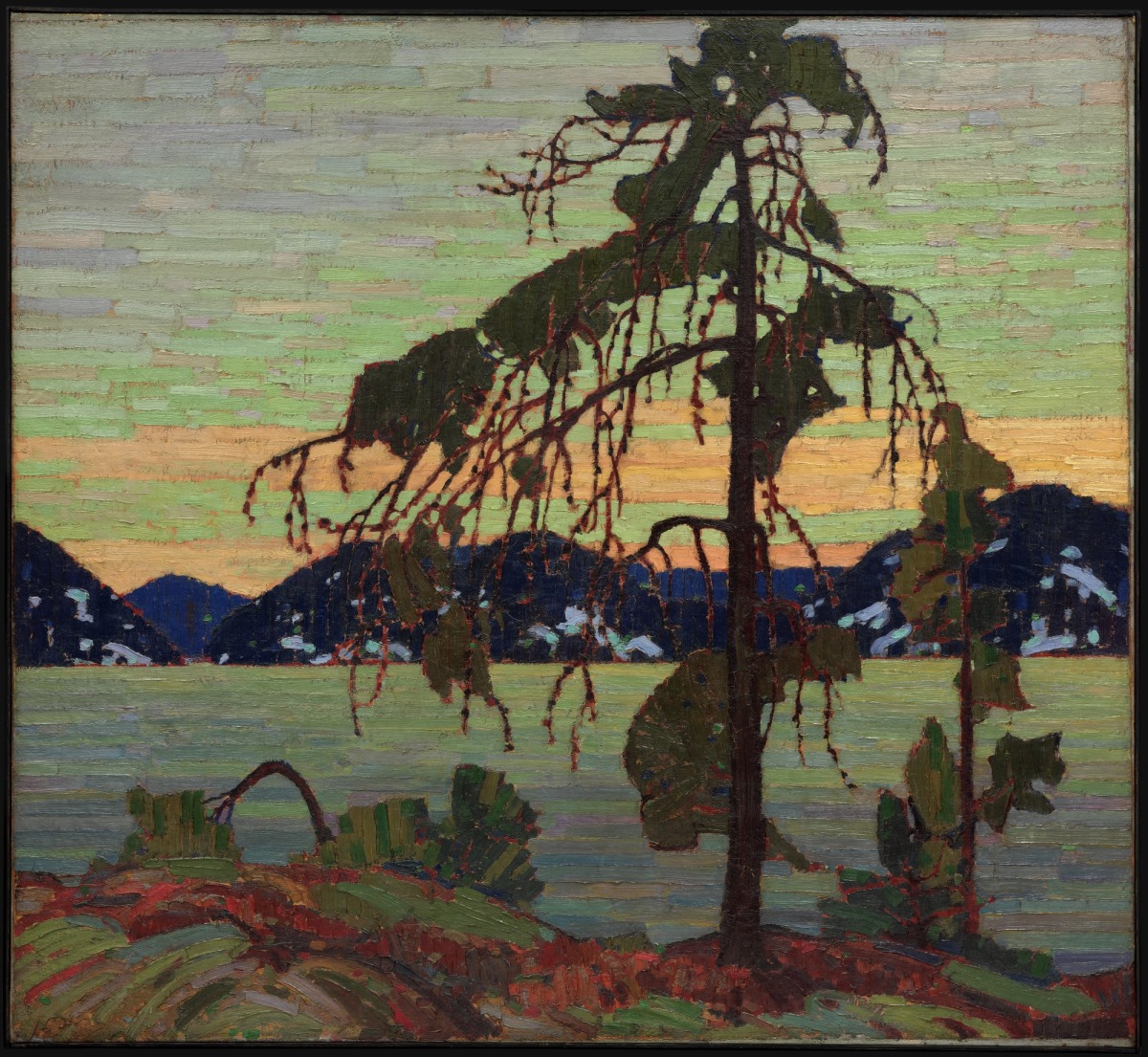This article is the first entry in a series on individual poems. Read the rest of the reviews, essays, or poem-talks here.
“Jack Pine” by Phoebe Wang

The poem “Jack Pine,” written by Phoebe Wang, is included in the collection Admission Requirements, published in 2017 by McClelland & Stewart. I’ve included a screen shot of the poem below, which is freely available on the web via Google:

I seem to read a lot of poetry on my phone these days — screenshots on Twitter, mostly. Most of these poems are contained in one .png, contained in one boxy attachment. And very short poems (i.e., of 14 lines and fewer) have always fascinated me. There’s something comforting in a poem wrestled down to its bare constituents: the promise of power, of connection, in as few lines as possible. There’s something aesthetically pleasing about ink-dark text on a simple white rectangle, or window. The promise, however imperfectly or infrequently fulfilled, that this little machine needs only 30 seconds to change your life.
They are also the poems I write the least. My best works, and my natural inclinations, both veer toward the long-winded, the expansive, the seemingly maximal. I go big, and most often fail going big, but it’s where I feel most comfortable.
So I have an admiration, and fascination, with five-sentence, 85-word poems like “Jack Pine,” because I find them difficult to write, and I find that when they work, they have a special quality of confirmation about them — like they are invested in and deeply concerned about not wasting my time.
“Jack Pine” is 14 lines, so perhaps it is also a diffused sonnet. It is certainly intimate, with its second-person address, its knowledge of the reader’s “dream” and the reader’s “heart.” It is the intimacy of loving someone, so partakes of the vocabulary of sonnets, the familiarity of a speaker addressing someone known and mastered. But are we still thinking second-person poems are about you? I use them to speak most affectionately or excoriatingly about myself. I am the ‘you’ in my poems, and I think “Jack Pine” also takes up this double-life. If the speaker began by saying, “It’s a skill to know the shape/ the wild world has in mind for me,” then we’d gain some mellifluousness but lose some element of certainty, wouldn’t we? “I’ve hardly a moment to root before/ my body’s battered …” changes the focus from the lyric ‘I,’ the woe-is-me, to the universal.
Let’s look at that first line: “It’s a skill to know the shape”. Strong, exacting, easily memorized trochaic tetrameter. This song, this prayer, resumes its trochaic meter with “has in mind for you,” but it’s first interrupted by “the wild world,” a spondee. And why not? This is the uncontrollable, untamable world: it should be grand, important sounding. So, “It’s a skill to know the shape … [something] … has in mind for you” is the mantra. The wild world is the problem: the spondaic, spiking hazard.
The “wild world” has a “mind,” it seems. This line gives me pause. I expect now that this world will be antagonistic to us. It has ulterior, unknowable motives; it wants to shape us into an image that we glean only through “skill.” With these important two lines, I’m hooked to know how, or why, we should know that it’s a “skill” to determine the world’s mind. What’s the skill? How do we learn it? What should we be wary of? What’s at stake?
“You’ve hardly a moment to root before/ your body’s battered by the tempestuous years.” Dactyls in the first line, iambs and anapests in the second. We’re steering away from our beginnings: much like we have no time to “root,” the speaker tells us, we have no time to get comfortable with the rhythms of the poem itself. These lines collide with or beat against us: the alliteration of “before/ your body’s battered by”: I like that sound-and-sense reinforcement. I also take the “you’ve hardly a moment” and “the tempestuous years” as methods to square this poem in an old-fashioned way of speaking. It’s not to sound antique for its own sake but to give the verse a bit of heft — like its advice is time-worn, passed down.
It’s clear to me by now in my reading that I am holding three things in mind: the picture of the speaker, reflecting on their own experience; the picture of myself, moving through the world; and the metaphor of a literal Jack Pine, growing from a seed into a mature specimen. We can hold all of these positions at once, and the stronger they flutter and superimpose, the more enriching the experience.
We’ve seen two couplets, each housing active-voiced sentences. The poem shakes things up again by sawing the next active-voiced sentence down to size: “You’re stunned to find yourself/ alone.” We have been trained to anticipate longer lines but we stop, abruptly, so “alone” feels lonely, sudden, bereft. That period or full stop really hits because if we kept the momentum of the line going for one more foot, we’d have perfect iambic pentameter. Instead, we are stunned. We stop. Cutting the line at “yourself” also plays with the notion of “finding yourself,” an overwrought cliché, then turns it over in a clever way. You find yourself alone — which we do, in the relative sense of growing up and apart from others — but we also “find” ourselves (luxuriating in that cliché for a moment) through individual self-inquiry. We are always alone, even with other people, so why would “finding” ourselves happen any other way?
The rest of the poem: two more sentences, stretched across nine lines.
The first continues to list — adding to being battered, not having time to rest or root, and loneliness — the problems we have, both trees and people, living in this “wild world.” “Your parents distant, fiery mobiles,” completes, with “alone,” that iambic pentameter we were subtly longing to hear (albeit with the ‘feminine ending’ in the fifth foot). “Fiery mobiles” is an image that needs the next line to complete, and the speaker wastes no time to clarify: your parents are fiery mobiles because they “revolve in their crystal spheres.” They are full of fire and passion, but they are now ornamental; they circle, spin, in solid material, and we are meant to imagine the cheap ornaments of a baby’s mobile but it’s worthwhile to remember that diamonds and snowflakes are crystals, too. Either way, much like the “spheres” above us, their influence is no longer overt, and whatever they’re doing in their revolutions, it doesn’t seem like much fun. It feels like frustration, or doldrums, or impotency. It feels trapped. The image elicits sympathy on a human scale; in the world of trees, it feels cosmic.
These lines echo in rhyme in the next. “Mobiles” recurs in “sills.” The word “spheres” haunts “sheer” (it’s all the same, wherever you look). Our “peers clinging to shallow sills” makes me think of pigeons, of skinny avian feet, so it’s no joy being part of the same cohort or generation as our speaker (pigeons, or seedlings in planters, in a greenhouse, or merely on rocky boreal hillsides with little soil in which to find purchase, if we’re holding the literal Jack Pine in mind). These “peers” are in the business of “procuring footholds,” and we sense in this choice of words the diligence and care with which these pigeon- or shrub-like beings broker and trade (and peck, and cling to) their spaces on “sills.” Are they looking into places of relative safety? Are they barred from entering? Are these homes, careers, places of social and spiritual security? From a human perspective, sure. The “sills” that are clung-to fall “sheer” — the poor creatures are doomed to tumble, to misstep.
“You dream of mastering a certain direction”: the security of expertise, of calling. But you “break/ limbs, make trade-offs, bow/ before necessity.” We’re watching the poem’s sentence structure shift again. “You,” the subject, is now forced into several infinitives: “dream,” “break,” “make,” “bow.” This has another battering, bewildering effect, as if we’re caught in a wind, hammered by stones. This is the crucible of the poem. The enjambment of “break/ limbs” is of course a small surprise, a pleasing twist, and summons to mind most forcibly the extended metaphor of the tree’s dilemma. A tree breaks limbs; a tree bows; and so do we, unfortunately.
I chose this poem to discuss here on my site because of what comes next: “and just when you feel/ your heart tapped out, grow/ into a grateful life.” This is the ‘volta’ of the sonnet, or the swerve in rhetoric. It might also be the ‘eucatastrophe’ (so, not a deus ex machina). According to Eric Michael Mazur in his Encyclopedia of Religion and Film, “eucatastrophe makes the bold claim that the arc of human history ultimately curves toward justice, restoration, and hope. From this perspective, rescue comes not from a conveniently inserted god but is part of the very fabric of a fictive world.” I suppose it is also a form of ‘anagnorisis,’ or the critical discovery; or perhaps the ‘peripeteia,’ or reversal of (dire) circumstances (we can look at Aristotle’s Poetics to determine the difference).
In any case, the arrival of “a grateful life” does not arrive logically from the preceding contents, so it surprises. It neither explains nor elaborates on the quality of gratitude stated. It doesn’t explain how this functions, or what it looks like. We simply gain a feeling, an intuitive understanding of what this might mean. We lose the Jack Pine now, in the end: we’re really talking about ourselves again. And, as with Mazur’s definition above, it arises from the fabric of the world, much like a tree arises from the alchemy of seed, soil, water, sunlight, the urgent imperative to live — “the force that through the green fuse drives the flower,” to quote Thomas.
It seems to be saying something quite simple. After opposition, solitude, danger and compromise — adversity stretching us to our limit, our point of collapse — we discover gratitude, which infuses our lives. We didn’t pursue it. It was there in the difficult work of living. It was waiting to grow from those early “roots” of our experience.
Is this true? Not always, I would say. The skill mentioned in the first line, mentioned and never returned to, is foreknowledge of the ‘happy ending’ to our process of overcoming and enduring. It is a skill that can perhaps be taught: good things are coming to those who suffer. Life is not a tragedy, held this way, but a comedy.
Perhaps more realistically, this is the process of each singular incidence of adversity. Life is not one long story, with a hard beginning and soft landing. Life is many stories. Adopting the “skill” of “Jack Pine” means preconceiving, anticipating, the gratitude beyond exhaustion that can be applied to a year, a month, a day, an hour, a minute, to this very second. Pain, and the release of pain. Over and over, without end. But not always so.
Is this what a Jack Pine does? Does a Jack Pine grow into gratitude, or merely a tree, expressing tree-ness, in its full imperfection? The latter is true, we’d say, from our limited perspective. But the poem insists anyway, anthropomorphically, magically: we should embody this knotty, bent way of growing, and become Jack Pines ourselves in every moment.

2 comments